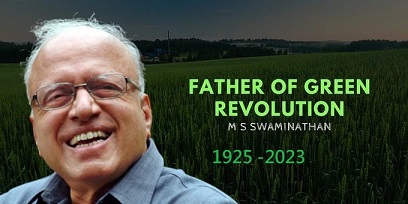Last Updated on September 28, 2023 11:45 pm by INDIAN AWAAZ

By Andalib Akhter
With demise of Professor Mankombu Sambasivan Swaminathan, popularly known as M.S. Swaminathan, India has lost its legendary agricultural scientist and a key architect of the country’s ‘Green Revolution
M S S passed away in Chennai on September 28, 2023. He was 98.
M S Swaminathan has been acclaimed by the TIME magazine as one of the twenty most influential Asians of the 20th century and one of the only three from India, the other two being Mahatma Gandhi and Rabindranath Tagore. He has been described by the United Nations Environment Programme as “the Father of Economic Ecology” because of his leadership of the ever-green revolution movement in agriculture and by Javier Perez de Cuellar, Secretary General of the United Nations, as “a living legend who will go into the annals of history as a world scientist of rare distinction”. He was Chairman of the UN Science Advisory Committee set up in 1980 to take follow-up action on the Vienna Plan of Action. He has also served as Independent Chairman of the FAO Council (1981-85) and President of the International Union for the Conservation of Nature and Natural Resources (1984-90). He was President of the World Wide Fund for Nature (India) from 1989-96. He also served as President of the Pugwash Conferences on Science and World Affairs (2002-07), President of the National Academy of Agricultural Sciences (1991-96 and 2005-07) and Chairman, National Commission on Farmers (2004-06). He was a trustee of Bibliotheca Alexandrina in its formative years.
M. S. Swaminathan, a plant geneticist by training, and Founder Chairman and Chief Mentor of the M. S. Swaminathan Research Foundation, Chennai, has long been an advocate of sustainable agriculture, of the move from the ‘green’ to an ‘evergreen revolution’ to ensure food and nutrition security for all, alongside the sustainability of global food systems.
He has served as the Chairman of the Government of India’s National Commission on Farmers, President of the Pugwash Conferences on Science and World Affairs. He was the recipient of the first World Food Prize for his leadership in India’s Green Revolution and the and numerous other national and international awards including Padma Vibushan, Ramon Magsaysay award.

Born in Kumbakonam on August 7, 1925 to Dr. M.K. Sambasivan, a surgeon, and Ms. Parvati Thangammal, Swaminathan had his schooling there. His keen interest in agricultural science coupled with his father’s participation in the freedom movement and Mahatma Gandhi’s influence inspired him to pursue higher studies in the subject. He secured two undergraduate degrees, including one from the Agricultural College, Coimbatore (now, Tamil Nadu Agricultural University).
Dr. Swaminathan worked very closely with many former Prime Ministers of India, and Heads of states for the success of the ‘Green Revolution,’ a programme that paved the way for quantum jump in food production and for a “Hunger free India & World”. His advocacy of sustainable agriculture makes him an acknowledged world leader in the field of sustainable food security. He also worked closely with Norman Borlaug, a celebrated American farm scientist and 1970 Nobel Laureate on developing high yielding wheat varieties.
“The test of our progress is not whether we add more to the abundance of those who have much, it is whether we provide enough for those who have little”
He served as Director of the Indian Agricultural Research Institute (1961-72), Director General of Indian Council of Agricultural Research and Secretary to the Government of India, Department of Agricultural Research and Education (1972-79), Principal Secretary, Ministry of Agriculture (1979-80), Acting Deputy Chairman and later Member (Science and Agriculture), Planning Commission (1980-82) and Director General, International Rice Research Institute, the Philippines (1982-88).
